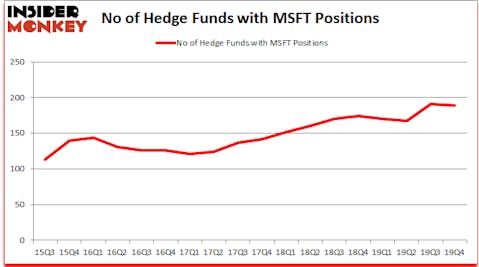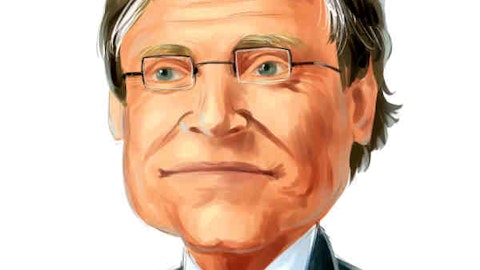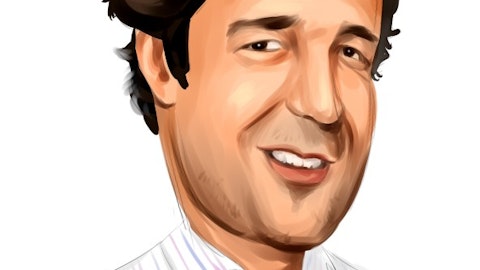Coronavirus is probably the #1 concern in investors’ minds right now. It should be. We estimate that COVID-19 will kill around 5 million people worldwide and there is a 3.3% probability that Donald Trump will die from the new coronavirus (see the details). So, how do we invest in this environment? We watch corporate insiders and hedge funds. Hedge funds’ top 5 stock picks returned 2.9% this year and beat the S&P 500 ETFs by nearly 7 percentage points. Investing in index funds guarantees you average returns, not superior returns. We are looking to generate superior returns for our readers. That’s why we believe it isn’t a waste of time to check out hedge fund sentiment before you invest in a stock like Microsoft Corporation (NASDAQ:MSFT).
Microsoft Corporation (NASDAQ:MSFT) has experienced a decrease in enthusiasm from smart money lately. MSFT was in 189 hedge funds’ portfolios at the end of the fourth quarter of 2019. There were 191 hedge funds in our database with MSFT holdings at the end of the previous quarter. Our calculations also showed that MSFT ranked 3rd among the 30 most popular stocks among hedge funds (click for Q4 rankings and see the video below for Q3 rankings).

Video: Click the image to watch our video about the top 5 most popular hedge fund stocks.
In the financial world there are a large number of tools investors have at their disposal to grade stocks. A pair of the most under-the-radar tools are hedge fund and insider trading indicators. We have shown that, historically, those who follow the top picks of the best fund managers can outperform the broader indices by a solid amount. Insider Monkey’s monthly stock picks returned 72.9% since March 2017 and outperformed the S&P 500 ETFs by more than 41 percentage points. Our short strategy outperformed the S&P 500 short ETFs by 20 percentage points annually (see the details here). That’s why we believe hedge fund sentiment is a useful indicator that investors should pay attention to.
We leave no stone unturned when looking for the next great investment idea. We read hedge fund investor letters, listen to stock pitches at hedge fund conferences, and go through short-term trade recommendations like this one. We even check out recommendations of services with hard to believe track records. Last month, we recommended a long position in one of the most shorted stocks in the market. No, our recommendation wasn’t Tesla (TSLA). It was a better pick than Tesla as this stock gained nearly 50% in 3 weeks. Keeping this in mind we’re going to take a look at the key hedge fund action surrounding Microsoft Corporation (NASDAQ:MSFT).
How are hedge funds trading Microsoft Corporation (NASDAQ:MSFT)?
At Q4’s end, a total of 189 of the hedge funds tracked by Insider Monkey were long this stock, a change of -1% from the previous quarter. The graph below displays the number of hedge funds with bullish position in MSFT over the last 18 quarters. So, let’s check out which hedge funds were among the top holders of the stock and which hedge funds were making big moves.

According to Insider Monkey’s hedge fund database, Ken Fisher’s Fisher Asset Management has the number one position in Microsoft Corporation (NASDAQ:MSFT), worth close to $3.3639 billion, amounting to 3.4% of its total 13F portfolio. The second most bullish fund manager is Boykin Curry of Eagle Capital Management, with a $2.912 billion position; 9.3% of its 13F portfolio is allocated to the stock. Other members of the smart money that hold long positions contain Cliff Asness’s AQR Capital Management, Chase Coleman’s Tiger Global Management and Phill Gross and Robert Atchinson’s Adage Capital Management. In terms of the portfolio weights assigned to each position Thrive Capital allocated the biggest weight to Microsoft Corporation (NASDAQ:MSFT), around 47.14% of its 13F portfolio. Joho Capital is also relatively very bullish on the stock, earmarking 20.99 percent of its 13F equity portfolio to MSFT.
Due to the fact that Microsoft Corporation (NASDAQ:MSFT) has experienced falling interest from the entirety of the hedge funds we track, logic holds that there lies a certain “tier” of hedgies that decided to sell off their entire stakes heading into Q4. It’s worth mentioning that Robert Pohly’s Samlyn Capital said goodbye to the largest investment of all the hedgies followed by Insider Monkey, worth an estimated $110 million in stock, and Dan Loeb’s Third Point was right behind this move, as the fund dumped about $83.4 million worth. These moves are intriguing to say the least, as total hedge fund interest dropped by 2 funds heading into Q4.
Let’s also examine hedge fund activity in other stocks similar to Microsoft Corporation (NASDAQ:MSFT). We will take a look at Alphabet Inc (NASDAQ:GOOGL), Alphabet Inc (NASDAQ:GOOG), Amazon.com, Inc. (NASDAQ:AMZN), and Facebook Inc (NASDAQ:FB). All of these stocks’ market caps match MSFT’s market cap.
| Ticker | No of HFs with positions | Total Value of HF Positions (x1000) | Change in HF Position |
|---|---|---|---|
| GOOGL | 163 | 13078124 | 5 |
| GOOG | 148 | 16215698 | 0 |
| AMZN | 202 | 28001232 | 21 |
| FB | 198 | 24395049 | 6 |
| Average | 177.75 | 20422526 | 8 |
View table here if you experience formatting issues.
As you can see these stocks had an average of 177.75 hedge funds with bullish positions and the average amount invested in these stocks was $20.4 billion. That figure was $27.4 billion in MSFT’s case. Amazon.com, Inc. (NASDAQ:AMZN) is the most popular stock in this table. On the other hand Alphabet Inc (NASDAQ:GOOG) is the least popular one with only 148 bullish hedge fund positions. Microsoft Corporation (NASDAQ:MSFT) is not the most popular stock in this group but hedge fund interest is still above average. Our calculations showed that top 20 most popular stocks among hedge funds returned 41.3% in 2019 and outperformed the S&P 500 ETF (SPY) by 10.1 percentage points. These stocks also gained 0.1% in 2020 through March 2nd and beat the market by 4.1 percentage points. Hedge funds were also right about betting on MSFT as the stock returned 9.9% during the first quarter (through March 2nd) and outperformed the market. Hedge funds were rewarded for their relative bullishness.
Disclosure: None. This article was originally published at Insider Monkey.




